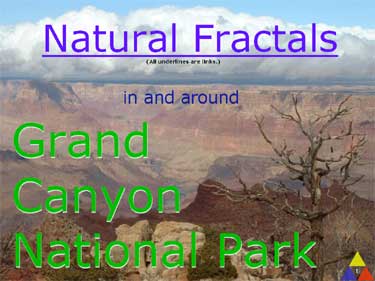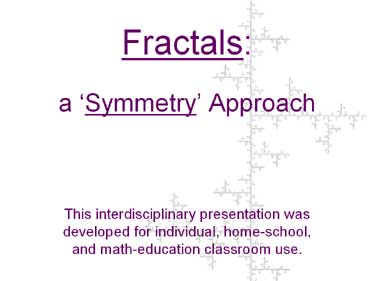|
These presentations are placed here for individual, traditional classroom, and homeschool access. Largely
photographic/visual, I have put images up in high enough quality for projection.
The symmetry presentation, designed for the math-ed classroom, is intentionally standards-rich.
The Grand Canyon presentation
was designed for appeal to a broad audience of GCNP visitors, to include nonEnglish speakers
(it is mostly visual with few words): the 42 slides that comprise the Canyon section
address a fractal pattern in the walls and rim of Grand Canyon that was shown to me by ASU Geology
Professor Paul Knauth. Dr. Knauth's 30-year interest in this pattern has nothing to do with its
fractility. It is, however, a vivid and extraordinary example of fractals in nature.
Accessible in both PowerPoint and PDF,
I belatedly learned that PC's and Mac's display some fonts differently, in particular, fonts that I have used.
If you have a Mac, my advice is to download the PDF version, a viewer is free if you need one. A handful of links didn't
preserve in the PDF version. To ensure that everyone has access to
all of the links, I have made separate links documents (that
aren't up at the moment because they need to be updated).
Keep in mind while viewing that this is a math-art website,
I am not trying to instruct per se. These were put together with the input of
experts who not only made suggestions, they helped out with content. Although the presentations are technically mine,
in a bigger sense they are products of a collaboration of ideas and expertise. Some people who have helped
want to stay in the background, but I am sure that Don Jones (Arizona State University), Paul Bourke (Swineburne University
of Technology, Centre for Astrophysics and Supercomputing), and Reimund Albers (University of Bremen)
will not mind being given credit as frequent sources of help and advice. I have referenced the
Yale Fractal Geometry website many times and encourage people to visit their pages at http://classes.yale.edu/fractals/, as well as Cynthia Lanius' pages for
those new to fractals at http://math.rice.edu/~lanius/frac/.
|

